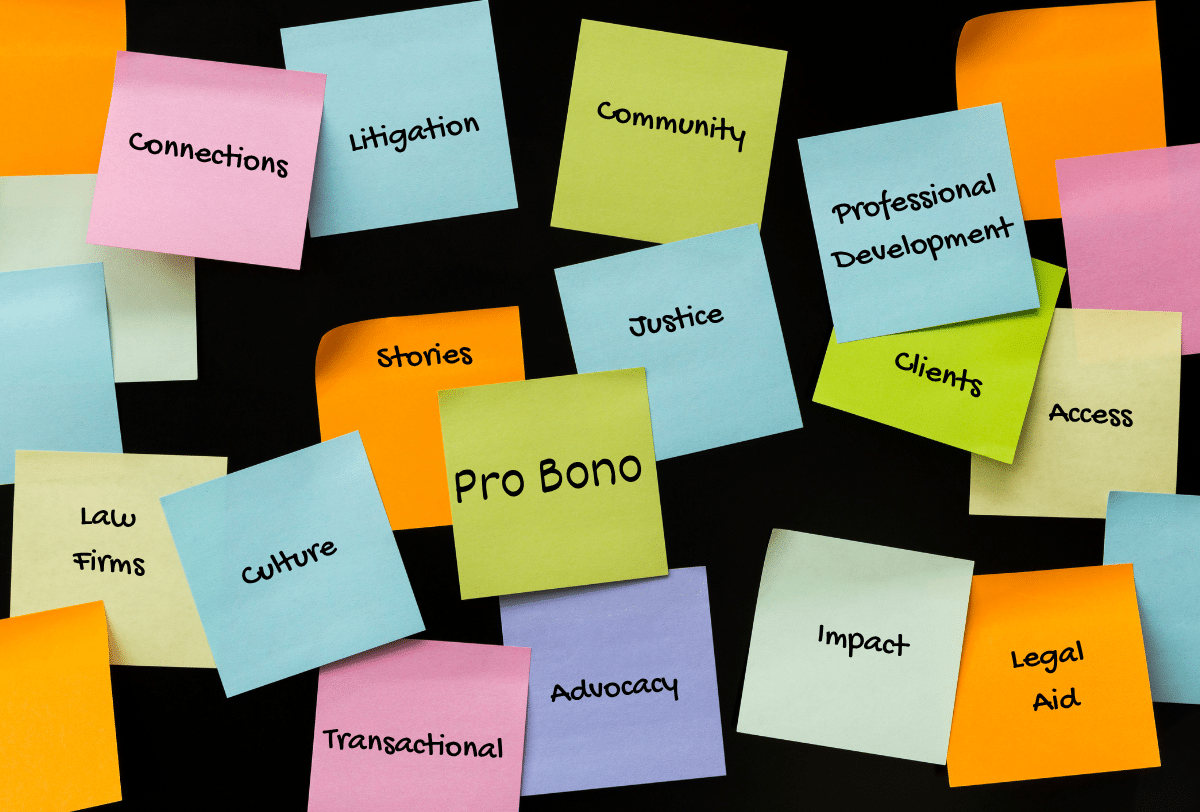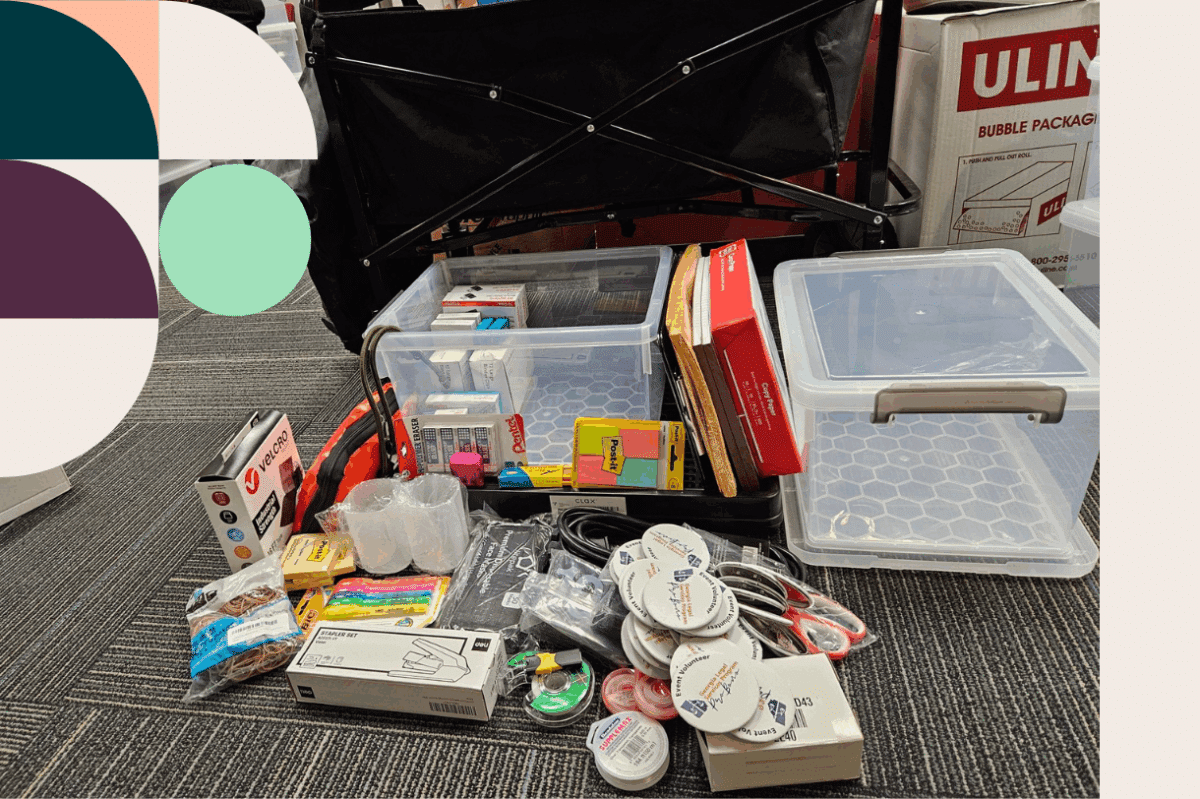Pro bono is part of the ethos of the legal community. There are many reasons why lawyers do pro bono work, but no matter the reason, it’s critical to filling the justice gap. Working with pro bono counsel across the country, it’s easy to see how hard these individuals work and the value they bring to not only doing pro bono work, but also to building and coordinating engagement across the firm. That raised a question: How do firms without dedicated pro bono professionals build and maintain a strong pro bono culture? I interviewed Pro Bono Committee Chairs from two firms that don’t have dedicated pro bono professionals to learn just that.
I sat down with Mike Turner, Pro Bono Committee Chair at Neal, Gerber & Eisenberg (NGE) and Julian Wright, Pro Bono Chair of Robinson Bradshaw, to learn what has worked for them and what advice they could share with other firms looking to make a stronger impact.
Hire Lawyers with a Demonstrated Commitment to Pro Bono and Community
A law firm’s culture is created by shared values around how the firm approaches the practice and business of law. Each individual contributes to this culture, so hiring the right people is fundamental. Firms that emphasize community connection and view pro bono not just as a responsibility, but as a privilege of the legal profession, should prioritize that value in their hiring practices.
“It starts with recruiting and hiring,” said Mike. “We look for lawyers who fit the culture, and a big part of this is connections to the community and doing pro bono and other volunteer work.”
Julian remarked, “Within our ethos and culture, we have a responsibility to do the pro bono legal work. My friend who is an accountant can serve with me at the local soup kitchen board, but she can’t go to court and represent a battered spouse in a domestic violence hearing, but I can. I have a responsibility to do so.”
Pro bono culture is built over time and focusing on hiring people who have a record of pro bono and community involvement will continue to build momentum around being service minded.
Connect Pro Bono to Professional Development
Pro bono is a fantastic way to develop both transactional and litigation skills. For example, many lawyers, litigators included, have never argued in a courtroom, but pro bono often provides a real-world opportunity. Representing low-income individuals helps lawyers strengthen soft skills like client communication and representation. In addition, pro bono can be a humbling experience that builds empathy, particularly when working with clients who have faced trauma, such as domestic violence, eviction, bankruptcy, or immigration challenges.
Linking pro bono to professional development is especially valuable for associate growth.
Julian emphasized this point. “Associates are constantly asking for more client time and more cases that they’re responsible for. They want to learn, be mentored and develop. They also want to do more on their own. Pro bono matters that are properly supervised can be an outstanding outlet for that.”
In addition to the hands-on representation of clients, lawyers often receive training and mentoring through the referring legal aid organization. In some states, pro bono can even be counted for CLE.
Julian shared an anecdote about one type of pro bono case the firm works on and the support provided by the referring legal aid organization. A few years back, there was a group of lawyers who wanted to work on pro bono matters that benefited children. The firm contacted Charlotte Center for Legal Advocacy (CCLA) and learned that the organization needed help with Immigrant Juvenile Status (SIJS) cases. As a first step, CCLA came out to the firm and provided a CLE program for lawyers interested in taking on these types of cases. From there, lawyers started taking on cases with continued support from the legal aid. He discussed how these cases have been an exceptional opportunity for lawyers to make court appearances, standing up in front of a judge and making an argument.
Sometimes pro bono as professional development is more formalized and the professional development or HR team might even coordinate some elements of a pro bono program. For instance, at NGE, the Professional Recruitment and Development department has a manager who splits time between professional development activities and managing pro bono initiatives at the firm.
Through my experiences at Paladin, a pro bono management technology, we found that firms are looking for a more formal connection between pro bono matters and skill development and we worked in combination with Benesch law firm to build this into our platform. Now, each time a legal aid organization circulates a pro bono opportunity through Paladin for placement, lawyers using Paladin are able to see what skills they might develop by taking on the matter and law firm administrators can also track these skills. Paladin will be extending this capability to our new law school product, which is being released Fall Semester 2025.
Build Relationships with Legal Aid Organizations
Building relationships with legal aid organizations is a win-win: the firm has a great avenue for finding pro bono matters for their lawyers; and the legal aid is able to help more clients who might not otherwise have received legal assistance. According to the Legal Services Corporation (LSC), 92% of civil legal matters do not receive adequate access to legal support.
Mike shared a bit about NGE’s preferred provider approach to working with legal aid organizations to help fill the justice gap. The firm has pre-screened four legal aid providers, which has the benefit of making it easier for a lawyer to move from volunteering to taking on a pro bono matter via these organizations. “Our preferred providers supply pro bono opportunities that meet the wide variety of skill sets of our lawyers,” said Mike. “If lawyers take on work through one of these organizations, they don’t have to go through the typical approval processes.”
Similarly, Robinson Bradshaw has built strong relationships with a handful of legal aids; and the overwhelming majority of pro bono work is referred by these organizations. “These relationships are important because we can have a high degree of confidence in cases that are sent by them. We know the matters have been vetted,” said Julian. “If I recruit an lawyer to do a case, it’s important that they have a good experience, and bringing in pro bono matters that have been properly vetted is critical to this experience.”
Curate Pro Bono Matters Across both Transactional and Litigation Areas
It’s common to hear that pro bono tends to have more of a focus on litigation; however, there are plenty of pro bono matters appropriate for corporate and transactional lawyers. It’s important for firms to make it simple for corporate lawyers and litigators alike to find pro bono matters in their wheelhouse. While these matters might not completely fit lawyers’ areas of practice, ensuring corporate lawyers have opportunities that fit the transactional mindset is important and vice versa.
Julian shared an example of transactional work the firm handles with a local organization, CLIMB, which supports historically economically disadvantaged individuals who are entrepreneurs or small business owners in need of corporate-related assistance. Needs include determining whether to structure as a corporation or LLC, or drafting form contracts.“We have teams of lawyers who work every year on matters with dozens of these types of clients. This work is very similar to the type of work they would be doing for firm clients,” said Julian.
Julian also shared examples on the litigation side, including handling a landlord-tenant case, representing clients in a jury trial, or preventing someone from being evicted. He connected these examples to professional development, as well as to how pro bono matters can be a valuable way to connect associates and shareholders. “Representing pro bono clients is a pretty cool professional opportunity. These opportunities help us develop our junior lawyers into better lawyers,” said Julian. “They also help to create relationships between the shareholders who would oversee them and the junior lawyers who are working on them. It’s been very, very effective.”
Sometimes these opportunities might even be within the same area of practice as the lawyer, but simply for a client of lesser means. For instance, Julian shared a story of one of their firm’s real estate lawyers, Brent, who helped support the real estate aspects of a local ministry’s development of a wing for temporary housing, helping to negotiate to buy the land, get part of the land donated, and negotiate a cut rate loan. “It’s the same stuff he does for paid clients, but in this case he was able to flex his skillset to help the ministry support the homeless population via this temporary housing,” said Julian.
Encourage lawyers to Go Out and Find Their Own Pro Bono Opportunities
Everybody is passionate about something; and oftentimes, lawyers will be more interested in taking on matters that connect to a passion. For instance, one lawyer might be interested in helping children, while another might be interested in helping veterans. It’s important to help lawyers find matters within causes and communities that fit their interests. There might be times when the firm doesn’t have relationships with a legal aid organization that fits with a lawyer’s interests, so it’s important for lawyers to know that the firm is supportive of them finding and bringing other ideas and opportunities.
Mike noted that his goal is to never hear the term, “I can’t find a pro bono project,” referring to encouraging lawyers to bring other ideas and organizations to them, beyond the opportunities available through their preferred providers. “If something speaks to a lawyer, we encourage them to bring it to us and the firm will support it, assuming it fits our definition of pro bono,” said Mike.
Ensure Leadership and Shareholders Are Doing Pro Bono
As with any cultural value a firm wants to foster, the message needs to come from the top. Julian took this a step further, highlighting the importance of not just support from leadership, but active involvement. He framed it as a generational cycle:
“It still amazes me to look around and realize I’ve been doing this for over 30 years, and I can still walk down the hall and see partners who’ve been at it for 40+ years,” said Julian. “Those folks did pro bono projects with me when I was a young lawyer, and now I do pro bono projects with younger lawyers. Hopefully, some of them will stick around and do the same with the next generation. It’s a generational cycle. It matters that those of us with more gray hair haven’t just done the work in the past—we’re still engaged. We’re setting the example for the next generation.”
Continue to Keep Pro Bono Front of Mind and Spread Stories of Success
It is important for pro bono to be part of a continuous conversation, with ongoing encouragement and reminders about how to get involved. Sustained engagement is more likely when incentives are aligned. For example, this could include offering billable hour credit or factoring pro bono into performance evaluations so that lawyers feel their efforts are valued and supported.
There are numerous ways to keep pro bono visible, from individual outreach by committee members and practice chairs to lawyers who might need a nudge, to monthly newsletters, case list circulations, and highlighting success stories during all-lawyer lunches. Sharing examples of impact, especially when tied to firm values or strategic goals, helps reinforce that pro bono is not just encouraged, but integrated into the firm’s culture. Sustaining momentum takes consistent commitment, clear communication, and institutional reinforcement.
Final Thoughts on Building a Strong Pro Bono Culture
For firms without a dedicated pro bono professional, the firms I spoke with made clear that culture comes first. It starts at the top — with leaders who not only encourage pro bono but do it themselves. “You need to create the stories,” said Julian. “Build that core group of people doing the work, and the culture builds from there.”
Equally important is looking outward. Rather than trying to invent opportunities, Mike discussed developing real relationships with legal aid organizations. “You’re not going to generically manufacture pro bono. Go find the partners that fit your community and your firm’s culture.”
Firms with dedicated pro bono professionals play an essential role in advancing access to justice — their leadership, coordination, and advocacy are often the engine behind robust, high-impact programs. At the same time, the experiences of firms without dedicated staff show that strong pro bono cultures can also be built through committed leadership, intentional hiring, community partnerships, and ongoing internal engagement. No matter the structure, what’s clear is that when pro bono is embedded into a firm’s values, the impact is far-reaching — for clients, for communities, and for the lawyers who do the work.
Leadership, storytelling, and community connection remain the foundation.




